国际学术会议常用语英语
国际学术会议常用语(英语)

学术会议常用表达1. 有关会议的一般信息(1)名称conference academic conference international conference symposium annual meeting/symposium/conference forum, international forum workshop(2)日期dates/important dates/key dates(3)地点location/venue conference location/venue(4)主题issues/themes/(main)topics/scope of conference conference themes/topicstopic of interests2.论文征稿、提交与录用call for abstract/proposal/paper paper deadlinedeadline for abstract/full paper/proposal submissionsubmission deadline deadline extendeddate for mortification of acceptance Paper acceptance/rejection will be informed by…deadline for authors notification camera ready version deadline3. 会议注册deadline/closing date for registration registration form registration information registration fees and items official invitation letter payment telegraphic transfer only bank transfer bank draft/check4. 会议进程及内容conference schedule/program preliminary conference programfinal conference program opening ceremony/sessionkeynote session/parallel session/tutorial session keynote speechoral presentation poster presentation tea/coffee break (buffet) lunch/(buffet)supper(welcome)banquet5. 会议具体细节opening introduction to speaker theme/paper presentation question and answer comment on speaker closing6.学术会议的问答讨论环节口语学术报告之后的问答讨论环节(Question and Answer Session)是同行之间交流的良好机会,双方可以针对报告中的具体问题进行探讨(1)答问的方式与技巧回答讨论环节可以让报告人通过互动及时地获得信息反馈并可以把在讨论中或得的建设性建议用于下一步的工作,因此对科研工作有很大的促进作用。
国际学术交流英语单词词汇
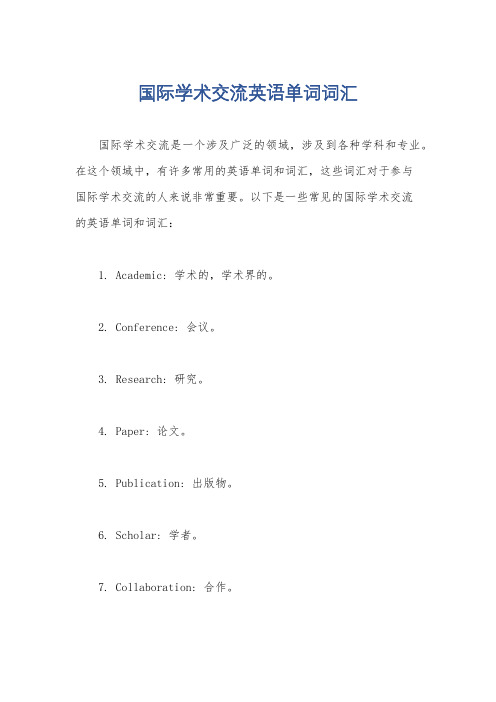
国际学术交流英语单词词汇国际学术交流是一个涉及广泛的领域,涉及到各种学科和专业。
在这个领域中,有许多常用的英语单词和词汇,这些词汇对于参与国际学术交流的人来说非常重要。
以下是一些常见的国际学术交流的英语单词和词汇:1. Academic: 学术的,学术界的。
2. Conference: 会议。
3. Research: 研究。
4. Paper: 论文。
5. Publication: 出版物。
6. Scholar: 学者。
7. Collaboration: 合作。
8. Presentation: 演讲,展示。
9. Abstract: 摘要。
10. Peer review: 同行评议。
11. Citation: 引用。
12. Thesis: 论文,论题。
13. Dissertation: 学位论文。
14. Plagiarism: 抄袭。
15. Academic integrity: 学术诚信。
16. Grant: 资助金,补助金。
17. Symposium: 座谈会,研讨会。
18. Panel: 小组讨论。
19. Academic journal: 学术期刊。
20. Academic writing: 学术写作。
这些词汇涵盖了国际学术交流中的各个方面,包括会议、研究、出版、合作等。
在国际学术交流中,熟悉并正确运用这些词汇是非常重要的,可以帮助人们更好地参与到国际学术交流中去。
同时,这些词汇也反映了国际学术交流的复杂性和多样性,需要人们具备丰富的词汇量和专业知识才能更好地融入这个领域。
希望以上信息对你有所帮助。
英语国际会议交流用语
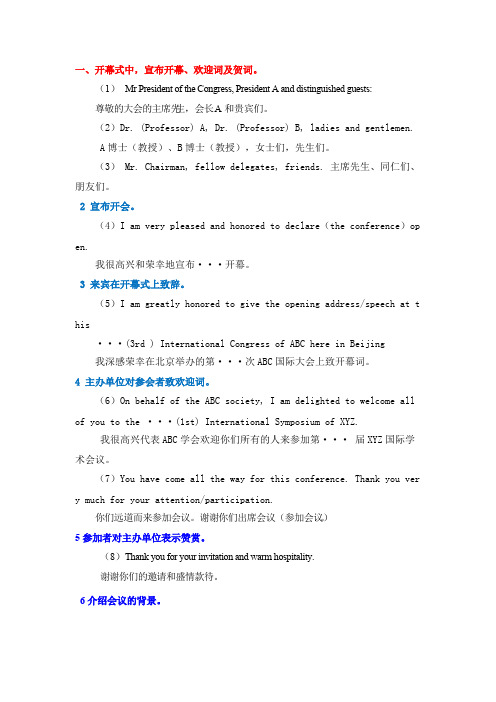
朋友们。 2 宣布开会。
(4)I am very pleased and honored to declare(the conference)op en.
我很高兴和荣幸地宣布···开幕。 3 来宾在开幕式上致辞。
(5)I am greatly honored to give the opening address/speech at t his
不幸地,我们要撤去二篇论文,即第 10 和第 11 篇。 (18)We have to reverse the order of No.5 and No.6. 时刻表有改变。第五篇和第六篇对调。 (19) There has been some change in the people listed on the program. Dr. A who was expected to present the second paper could not attend this m eeting, and Dr. B will present the paper. 列在节目单上的报告人已有些变动,原定由 A 博士报告的第二篇论文,因 (他)不能出席这个会议,而由 B 博士来报告。 二.主持报告用语 1.宣布开始和引导演讲 (20) The first paper this morning will be presented by Dr. A, professor of polymer science at XYZ University, and his topic is “ …(title)… “, Dr. A. 今天上午第一篇论文将由 XYZ 大学高分子科学教授 A 博士宣读。他的题目 是“…(题目)…“,A 博士。 (21)The next presentation in this session is on “…… (title)……”. I would like to call on [ask] Dr. A to talk this very important subject. 本会场下一个报告是:“……(题目)……”。我想请[要求]A 博士谈谈 这一十分重要的课题。
国际学术会议常用语英语

国际学术会议常用语英语This model paper was revised by LINDA on December 15, 2012.学术会议常用表达1. 有关会议的一般信息(1)名称conference academic conference international conference symposiumannual meeting/symposium/conference forum, international forum workshop(2)日期dates/important dates/key dates(3)地点location/venue conference location/venue(4)主题issues/themes/(main)topics/scope of conference conference themes/topics topic of interests2.论文征稿、提交与录用call for abstract/proposal/paper paper deadlinedeadline for abstract/full paper/proposal submissionsubmission deadline deadline extendeddate for mortification of acceptance Paper acceptance/rejectionwill be informed by…deadline for authors notification camera ready version deadline3. 会议注册deadline/closing date for registration registration form registration informationregistration fees and items official invitation letter paymenttelegraphic transfer only bank transferbank draft/check4. 会议进程及内容conference schedule/program preliminary conference programfinal conference program opening ceremony/session keynote session/parallel session/tutorial sessionkeynote speechoral presentation poster presentationtea/coffee break(buffet) lunch/(buffet)supper (welcome)banquet5. 会议具体细节opening introduction to speakertheme/paper presentationquestion and answer comment on speakerclosing6.学术会议的问答讨论环节口语学术报告之后的问答讨论环节(Question and Answer Session)是同行之间交流的良好机会,双方可以针对报告中的具体问题进行探讨(1)答问的方式与技巧回答讨论环节可以让报告人通过互动及时地获得信息反馈并可以把在讨论中或得的建设性建议用于下一步的工作,因此对科研工作有很大的促进作用。
国际学术会议英语答案

国际学术会议英语答案1. Professor Eric will give us a series of wonderful _________(讲座)this Friday. [填空题] *空1答案:lectures2. However, he was not afraid of danger and continued conducting this ________ (实验). [填空题] *空1答案:experiment3. After ________ (探索)the old part of the town , there is a guided tour of the church. [填空题] *空1答案:exploring4. He continued to pursue his _________ (目标) of becoming a professional footballer. [填空题] *空1答案:goal5. Please _______(修改)the draft to improve its content. [填空题] *空1答案:revise6. She has such a kind, friendly _________ (个性). [填空题] *空1答案:personality7. The president will present the ____________(策略)tomorrow afternoon. [填空题] *空1答案:strategy8. Little Tony is always enjoying the _________(陪伴)of his parents. [填空题] *空1答案:company9. Everyone can greatly __________(改善)the quality of life. [填空题] *空1答案:improve10. It’s hard for the lawyer to guarantee their rights when there is no _____(正式的)contract. [填空题] *空1答案:formal11. To be honest, I_________ (frighten) by thunder just now. [填空题] *空1答案:was frightened12. What attracted people most were not only their ___________ (impress) sports skills but also the mental strength they showed in the competition. [填空题] *空1答案:impression13. The audience is waiting ___________ (anxious) to see which team will win. [填空题] *空1答案:anxiously14. By giving children a lot of praise, parents think they’re building their children’s________ (confident). [填空题] *空1答案:confidence15. Cultural differences are not just about _________ (nation), races or beliefs. [填空题] *空1答案:nationality/nationalities16. The UN is an international ________ (organise) that helps countries to solve problems peacefully. [填空题] *空1答案:organization17. It is necessary for every student to take _______ (note) in class. [填空题] *空1答案:notes18. Your choice of clothes is a reflection of your __________ (personal). [填空题] *空1答案:personality19. Though your work is brilliant, there is still room for _________(improve). [填空题] *空1答案:improvement20. At the gate, she wrote only her name and phone number on the _____(register) form. [填空题] *空1答案:registration。
国际学术会议常用语(英语)
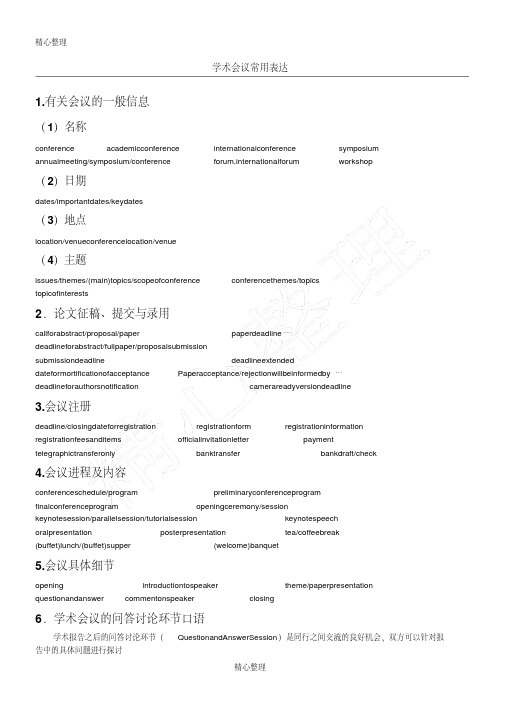
④问题的类型
对于寻求具体解释的一些问题, 可以简单地重复报告的内容来对问题进行说明或证明,
或是澄清听众的误解。 如
果提问者对报告内容提出不同见解,可以通过资料、事实、数据等来证明自己的观点,但一定注意态度要礼貌谦
和。 对于过于复杂的深层问题无法进行简单回答时, 可以在简略回答之后邀约提问者在其他时间进行讨论。
准备作为准备工作的一部分,进行深入考虑,全面的预测听众可能提出的问题,可以假设一些问题,并准备好最
合适的解答。如果会议没有统一安排每个报告的问答环节,报告者在进行报告时就要预先告知听众随后的
Q&
ASession,这样可以让听众为提问做好准备。
②过程控制
在时间允许的情况下尽可能让每个想提问的人都有机会提问,
③答问方式
应首先仔细听清问题, 在回答之前应将问题清楚的重复一遍, 这可以保证对问题的正确理解, 确保每个人都能听 清楚问题,同时给自己一些时间来思考,表述答案前可做片刻停留,这既引起了听众的注意,又表明了对答案的 谨慎态度, 同时也给自己留更多的思考空间。 不要对问题进行评价, 避免说类似 “ Thatwasagreatquestion”的话, 如果想要对某一问题进行肯定,可以用“ Thanksforaskingthatquestion ”或“ Igetaskedthatquestionbymanypeople. ” 等中性的表述,还可以让听众感到平等。回答问题时应尽可能简洁,切题。在回答中应尽可能多地提及报告中的 内容,这有利于听众对报告内容加深印象,并有利于控制问答环节的主题。
精心整理
学术会议常用表达
1.有关会议的一般信息
( 1)名称
conference
academicconference
学术英语中的重要词汇梳理
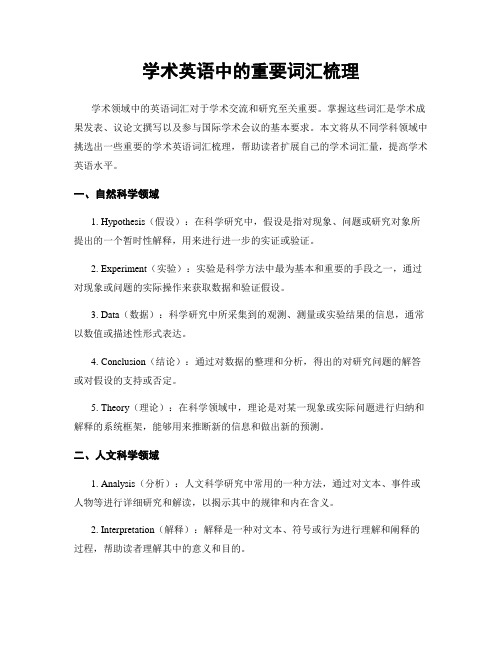
学术英语中的重要词汇梳理学术领域中的英语词汇对于学术交流和研究至关重要。
掌握这些词汇是学术成果发表、议论文撰写以及参与国际学术会议的基本要求。
本文将从不同学科领域中挑选出一些重要的学术英语词汇梳理,帮助读者扩展自己的学术词汇量,提高学术英语水平。
一、自然科学领域1. Hypothesis(假设):在科学研究中,假设是指对现象、问题或研究对象所提出的一个暂时性解释,用来进行进一步的实证或验证。
2. Experiment(实验):实验是科学方法中最为基本和重要的手段之一,通过对现象或问题的实际操作来获取数据和验证假设。
3. Data(数据):科学研究中所采集到的观测、测量或实验结果的信息,通常以数值或描述性形式表达。
4. Conclusion(结论):通过对数据的整理和分析,得出的对研究问题的解答或对假设的支持或否定。
5. Theory(理论):在科学领域中,理论是对某一现象或实际问题进行归纳和解释的系统框架,能够用来推断新的信息和做出新的预测。
二、人文科学领域1. Analysis(分析):人文科学研究中常用的一种方法,通过对文本、事件或人物等进行详细研究和解读,以揭示其中的规律和内在含义。
2. Interpretation(解释):解释是一种对文本、符号或行为进行理解和阐释的过程,帮助读者理解其中的意义和目的。
3. Literature review(文献综述):在人文科学领域的研究中,文献综述是一种对相关研究文献进行搜集、整理和分析的方法,以获得对研究问题或主题的全面认识。
4. Critique(批评):在学术论述中,批评是对某个观点、理论或研究进行评价和评估的过程,包括识别其优点和缺点,并提出改进或替代建议。
5. Methodology(方法论):研究方法和方法论是人文科学研究中不可或缺的部分,指导研究者在进行研究时选择适当的研究方法和方式。
三、社会科学领域1. Survey(调查):社会科学研究中常用的一种数据收集和分析方法,通过问卷、面谈或观察等方式收集大量数据,了解社会现象和人们的行为。
国际学术会议常用语(英语)
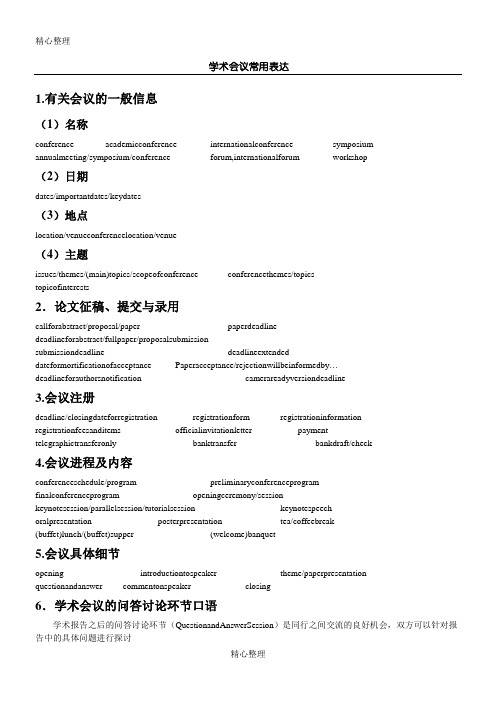
学术会议常用表达1.有关会议的一般信息(1)名称conference academicconference internationalconference symposiumannualmeeting/symposium/conference forum,internationalforum workshop(2)日期(3(423.4.keynotesession/parallelsession/tutorialsession keynotespeechoralpresentation posterpresentation tea/coffeebreak(buffet)lunch/(buffet)supper (welcome)banquet5.会议具体细节opening introductiontospeaker theme/paperpresentation questionandanswer commentonspeaker closing6.学术会议的问答讨论环节口语学术报告之后的问答讨论环节(QuestionandAnswerSession)是同行之间交流的良好机会,双方可以针对报告中的具体问题进行探讨(1)答问的方式与技巧回答讨论环节可以让报告人通过互动及时地获得信息反馈并可以把在讨论中或得的建设性建议用于下一步的工作,因此对科研工作有很大的促进作用。
对于如此重要的环节,报告人在报告之前应进行必要的准备,尽可能地保证这一环节完整、流畅地进行,一般应注意以下几点。
①准备工作学术报告中的提问者往往是相关领域中的专家,对报告的内容非常熟悉,因此所提出的问题可能会有相当的深度、广度以及不可预见性,有时甚至直接指出研究工作中的不完善之处或漏洞所在。
由于时间关系,回答者在现场一般没有充分的时间进行考虑,这就要求报告人要事先进行充分的准备。
在报告前,报告人应将对答环节的准备作为准备工作的一部分,进行深入考虑,全面的预测听众可能提出的问题,可以假设一些问题,并准备好最合适的解答。
国际学术会议常用语(英语)
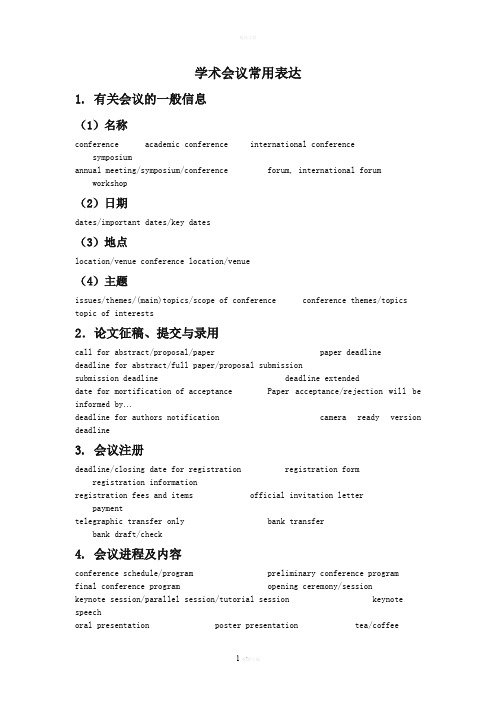
学术会议常用表达1. 有关会议的一般信息(1)名称conference academic conference international conference symposiumannual meeting/symposium/conference forum, international forum workshop(2)日期dates/important dates/key dates(3)地点location/venue conference location/venue(4)主题issues/themes/(main)topics/scope of conference conference themes/topics topic of interests2.论文征稿、提交与录用call for abstract/proposal/paper paper deadlinedeadline for abstract/full paper/proposal submissionsubmission deadline deadline extendeddate for mortification of acceptance Paper acceptance/rejection will be informed by…deadline for authors notification camera ready version deadline3. 会议注册deadline/closing date for registration registration form registration informationregistration fees and items official invitation letter paymenttelegraphic transfer only bank transferbank draft/check4. 会议进程及内容conference schedule/program preliminary conference programfinal conference program opening ceremony/sessionkeynote session/parallel session/tutorial session keynote speechoral presentation poster presentation tea/coffeebreak(buffet) lunch/(buffet)supper (welcome)banquet5. 会议具体细节opening introduction to speaker theme/paper presentationquestion and answer comment on speaker closing6.学术会议的问答讨论环节口语学术报告之后的问答讨论环节(Question and Answer Session)是同行之间交流的良好机会,双方可以针对报告中的具体问题进行探讨(1)答问的方式与技巧回答讨论环节可以让报告人通过互动及时地获得信息反馈并可以把在讨论中或得的建设性建议用于下一步的工作,因此对科研工作有很大的促进作用。
国际会议交流英语综合知识概要

1
会议通知 (conference notice)
2
会议日程表(conference schedule / program)
3
会议邀请函(conference invitation)
4
论文征集 (call for papers)
5
会议回执(letter of acceptance to a conference)
Colloquium 2008 16
Brief Introduction of Conference
大会开幕式
General Assembly
全体大会
Plenary Sessions
Formal Meetings
张贴会
Poster Sessions
Oral Presentation (SimPualrtaalnleeloSuessSseiosnsisonsP) oster Presentation
21
Visits and Other Social Activities
• Visits to famous places, such as research institutes, universities, museums, or historical spots.
• Various social events, such as banquets, parties, excursions, games,etc.
8
Brief Introduction of Conference
Meeting
Conference
Symposium
Congress
会议
Seminar
Convention
国际会议交流英语一般知识概要
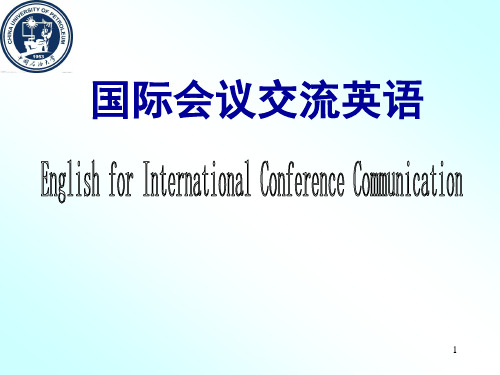
Brief Introduction of Conference
Meeting
Conference
Symposium
Congress
会议
Seminar
Convention
Workshop Colloquium Forum
Forum——论坛,公众会议,讨论大众关心问题的集 会。如Education Forum, Finance Forum
on Polymer Hydrogel
Brief Introduction of Conference
Meeting Symposium
Conference Congress
Convention Colloquium Forum
会议
Seminar
Workshop
Seminar——讨论会,如教授定期与学生讨论他们的报 告和发现、研究生班的专题讨论会。Research Seminar (科 研讨论会)、Teaching Seminar(课堂讨论会)、 Problem Seminar (问题讨论会) 9
国际会议交流英语
1
Brief Introduction of Conference
Meeting Conference Symposium
Congress
会议
Seminar
Convention
Workshop
Colloquium Forum
Meeting——会议,最一般的用词,规模可大可小,层 次可高可低,可以是正式或非正式的聚会,如告别会 议、联席会议、首脑会议、紧急会议等。 2
(1 )This first International Conference on Water and Society aims to provide a multi-disciplinary forum for the presentation and discussion of many issues affecting water resources today.
国际学术交流英语ppt课件
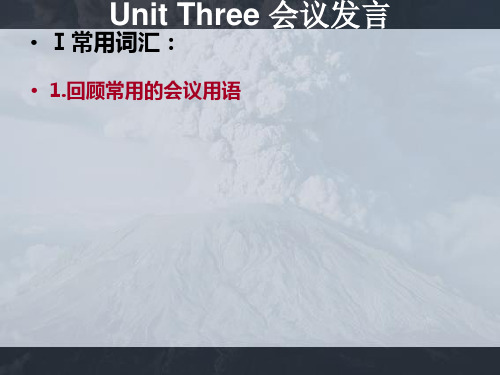
职务、学术成果、社会活动、其他个人信 息) • 3. 发言顺序 • 4. 邀请第一位演讲人
Task 1 介绍发言人
• Ⅰ Before listening, please read the useful patterns and expressions often used in introducing a a speaker in the data bank.
Unit Three 会议发言
• Ⅰ常用词汇:
• 1.回顾常用的会议用语
Unit Three 会议发言
• Ⅰ常用词汇:
• 1.会议用语
• Meeting
• 普通用词,词义广泛。指一般性的会议,可用于 各种场合。
• e.g. •
• 峰会 • a summit meeting • 参加会议 • attend a meeting
• a farewell meeting
• 联欢会
• a convivial meeting
• 筹备会议
• preparatory meeting
Unit Three 会议发言
• Ⅰ常用词汇:
• Conference
• (通常持续几天的大型正式)会议, 如政府工作会 议、国际学术交流会议、各国之间的协商、会谈 等。
• 研讨会、专题报告 symposium (pl.
symposia/symposium)
• is a kind of meeting, but if refers exclusively to the meetings for specialized academic discussion.
• The symposium on AIDS research lasted two days.
国际会议交流英语一般知识概要

国际会议是不同国籍者的会议。
5
Brief Introduction of Conference
Meeting Conference Symposium
Congress
会议
Seminar
Convention
Workshop Colloquium Forum
Meeting——会议,最一般的用词,规模可大可小,层 次可高可低,可以是正式或非正式的聚会,如告别会 议、联席会议、首脑会议、紧急会议等。 6
International Conference on Smart Materials 等
7
Brief Introduction of Conference
Meeting
Conference Symposium
Congress
会议
Seminar
Convention
Workshop
Colloquium
聚众议事
4
Brief Introduction of Conference
一个群体的集会,至少三人,两人的聚会称为“对话”;
必须有主持人,没有人主持的聚会断不能行事;
有一定议事规则,遵循一定规矩,有始有终,发言有
先有后; 有明确的议题,反映共同关心的问题; 有一定的目的,而不是无意识的活动; 有一定的结果; 一种临时性的行为,世界上不存在永无止境的会议。
组织信息 Organizational Information
与会人员信息 会议日程信息 Participants Conference Program Information Information
Abstract:最终期限、长度、格式 participants:与会名额 Agenda:议程 Name Sponsors & Organizers:发起人,主办方 (会议名称) Number of Full Text:最终期限、长度、格式、 for Arrangement of paper presentation:报告安排 Organizing Committee:组委会 attendances:与会资格要求 Date (会议日期) Requirements 影印以及其它一些要求。 Academic Committee:学术委员会 Material distribution:材料发放 Location (会议地点) Conference VIPs (Very Important Persons):特 Model of Presentation:口头报告、 约嘉宾 Secretariat:大会秘书处 Secretarial sections:秘书处办公地点 Topics for Discussion 墙报,报告时间,报告所需条件, Other Members: other facilities: 版权问题等。 Other Committee:如协作单位、赞助单位等 (会议主题)
英语国际会议交流用语资料

英语国际会议交流用语一、开幕式中,宣布开幕、欢迎词及贺词。
(1)Mr President of the Congress, President A and distingu ished guests:尊敬的大会的主席先生,会长A和贵宾们。
(2)Dr. (Professor) A, Dr. (Professor) B, ladies and gen tlemen.A博士(教授)、B博士(教授),女士们,先生们。
(3)Mr. Chairman, fellow delegates, friends. 主席先生、同仁们、朋友们。
2 宣布开会。
(4)I am very pleased and honored to declare(the confer ence)open.我很高兴和荣幸地宣布···开幕。
3 来宾在开幕式上致辞。
(5)I am greatly honored to give the opening address/spe ech at this···(3rd) International Congress of ABC here in Beijin g我深感荣幸在北京举办的第···次ABC国际大会上致开幕词。
4 主办单位对参会者致欢迎词。
(6)On behalf of the ABC society, I am delighted to we lcome all of you to the ···(1st) International Symposium of XYZ.我很高兴代表ABC学会欢迎你们所有的人来参加第···届XYZ国际学术会议。
(7)You have come all the way for this conference. Than k you very much for your attention/participation.你们远道而来参加会议。
国际学术会议常用语(英语)

国际学术会议常用语(英语)学术会议常用表达1. 有关会议的一般信息(1)名称conference academic conference international conference symposium annual meeting/symposium/conference forum, international forum workshop (2)日期dates/important dates/key dates(3)地点location/venue conference location/venue(4)主题issues/themes/(main)topics/scope of conference conference themes/topicstopic of interests2.论文征稿、提交与录用call for abstract/proposal/paperpaper deadlinedeadline for abstract/full paper/proposal submissionsubmission deadline deadline extended5. 会议具体细节opening introduction to speaker theme/paper presentationquestion and answer comment on speaker closing6.学术会议的问答讨论环节口语学术报告之后的问答讨论环节(Question and Answer Session)是同行之间交流的良好机会,双方可以针对报告中的具体问题进行探讨(1)答问的方式与技巧回答讨论环节可以让报告人通过互动及时地获得信息反馈并可以把在讨论中或得的建设性建议用于下一步的工作,因此对科研工作有很大的促进作用。
对于如此重要的环节,报告人在报告之前应进行必要的准备,尽可能地保证这一环节完整、流畅地进行,一般应注意以下几点。
国际学术会议英语发言稿
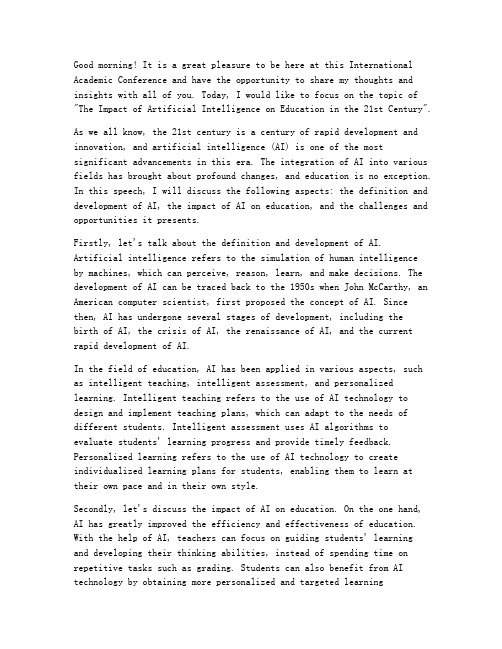
Good morning! It is a great pleasure to be here at this International Academic Conference and have the opportunity to share my thoughts and insights with all of you. Today, I would like to focus on the topic of "The Impact of Artificial Intelligence on Education in the 21st Century".As we all know, the 21st century is a century of rapid development and innovation, and artificial intelligence (AI) is one of the most significant advancements in this era. The integration of AI into various fields has brought about profound changes, and education is no exception. In this speech, I will discuss the following aspects: the definition and development of AI, the impact of AI on education, and the challenges and opportunities it presents.Firstly, let's talk about the definition and development of AI.Artificial intelligence refers to the simulation of human intelligenceby machines, which can perceive, reason, learn, and make decisions. The development of AI can be traced back to the 1950s when John McCarthy, an American computer scientist, first proposed the concept of AI. Since then, AI has undergone several stages of development, including thebirth of AI, the crisis of AI, the renaissance of AI, and the current rapid development of AI.In the field of education, AI has been applied in various aspects, such as intelligent teaching, intelligent assessment, and personalized learning. Intelligent teaching refers to the use of AI technology to design and implement teaching plans, which can adapt to the needs of different students. Intelligent assessment uses AI algorithms toevaluate students' learning progress and provide timely feedback. Personalized learning refers to the use of AI technology to create individualized learning plans for students, enabling them to learn at their own pace and in their own style.Secondly, let's discuss the impact of AI on education. On the one hand, AI has greatly improved the efficiency and effectiveness of education. With the help of AI, teachers can focus on guiding students' learningand developing their thinking abilities, instead of spending time on repetitive tasks such as grading. Students can also benefit from AI technology by obtaining more personalized and targeted learningresources. On the other hand, AI has brought about new challenges to education. For example, the rapid development of AI technology may lead to a decline in the importance of human teachers, and the increasing use of AI in education may cause students to lose the opportunity to communicate and interact with their peers.Thirdly, let's explore the challenges and opportunities presented by AI in education. Challenges include the following aspects:1. The quality of AI technology: As AI technology continues to develop, the quality of AI products will also vary. In the field of education,the use of low-quality AI products may have a negative impact onstudents' learning.2. The digital divide: In the process of integrating AI into education, the digital divide may become more prominent. Students from disadvantaged backgrounds may not have access to high-quality AI resources, which will further widen the gap between students.3. Ethical issues: The use of AI in education raises ethical issues,such as the protection of students' personal information and the prevention of AI bias.Opportunities include the following aspects:1. Innovation in education: AI technology can promote the innovation of educational methods, teaching materials, and assessment methods, and improve the overall quality of education.2. Improvement of educational equity: AI technology can help to break through the barriers of time and space, making high-quality education resources more accessible to students from all over the world.3. Development of educational talent: AI technology can provide students with more personalized and targeted learning experiences, helping themto develop their unique talents and potential.In conclusion, the impact of AI on education is both profound and complex. While AI technology has brought about significant benefits to education, it also presents new challenges. As educators and researchers,we need to actively explore and solve these challenges, and seize the opportunities brought by AI technology to promote the development of education in the 21st century.Thank you for your attention, and I look forward to your comments and suggestions.。
- 1、下载文档前请自行甄别文档内容的完整性,平台不提供额外的编辑、内容补充、找答案等附加服务。
- 2、"仅部分预览"的文档,不可在线预览部分如存在完整性等问题,可反馈申请退款(可完整预览的文档不适用该条件!)。
- 3、如文档侵犯您的权益,请联系客服反馈,我们会尽快为您处理(人工客服工作时间:9:00-18:30)。
国际学术会议常用语英语 Modified by JEEP on December 26th, 2020.学术会议常用表达1. 有关会议的一般信息(1)名称conference academic conference international conferencesymposiumannual meeting/symposium/conference forum, international forum workshop(2)日期dates/important dates/key dates(3)地点location/venue conference location/venue(4)主题issues/themes/(main)topics/scope of conference conference themes/topicstopic of interests2.论文征稿、提交与录用call for abstract/proposal/paper paper deadline deadline for abstract/full paper/proposal submissionsubmission deadline deadline extended date for mortification of acceptance Paper acceptance/rejection will be informed by…deadline for authors notification camera ready version deadline3. 会议注册deadline/closing date for registration registration form registration informationregistration fees and items official invitation letterpaymenttelegraphic transfer only bank transferbank draft/check4. 会议进程及内容conference schedule/program preliminary conference program final conference program opening ceremony/session keynote session/parallel session/tutorial session keynote speechoral presentation poster presentationtea/coffee break(buffet) lunch/(buffet)supper (welcome)banquet5. 会议具体细节opening introduction to speakertheme/paper presentationquestion and answer comment on speaker closing6.学术会议的问答讨论环节口语学术报告之后的问答讨论环节(Question and Answer Session)是同行之间交流的良好机会,双方可以针对报告中的具体问题进行探讨(1)答问的方式与技巧回答讨论环节可以让报告人通过互动及时地获得信息反馈并可以把在讨论中或得的建设性建议用于下一步的工作,因此对科研工作有很大的促进作用。
对于如此重要的环节,报告人在报告之前应进行必要的准备,尽可能地保证这一环节完整、流畅地进行,一般应注意以下几点。
①准备工作学术报告中的提问者往往是相关领域中的专家,对报告的内容非常熟悉,因此所提出的问题可能会有相当的深度、广度以及不可预见性,有时甚至直接指出研究工作中的不完善之处或漏洞所在。
由于时间关系,回答者在现场一般没有充分的时间进行考虑,这就要求报告人要事先进行充分的准备。
在报告前,报告人应将对答环节的准备作为准备工作的一部分,进行深入考虑,全面的预测听众可能提出的问题,可以假设一些问题,并准备好最合适的解答。
如果会议没有统一安排每个报告的问答环节,报告者在进行报告时就要预先告知听众随后的Q&A Session,这样可以让听众为提问做好准备。
②过程控制在时间允许的情况下尽可能让每个想提问的人都有机会提问,不要让少数提问者的提问占据整个讨论环节,应按照提问者举手示意的顺序来请出提问者。
在开始回答问题时,首先与提问者目光接触,然后转向其他所有听众,这样可以获得所有听众的注意。
在回答完毕之后,可以再次通过目光了解提问者是否对回答表示满意。
报告人应控制整个讨论的过程,对于与主题无关的问题可以礼貌地回避。
③答问方式应首先仔细听清问题,在回答之前应将问题清楚的重复一遍,这可以保证对问题的正确理解,确保每个人都能听清楚问题,同时给自己一些时间来思考,表述答案前可做片刻停留,这既引起了听众的注意,又表明了对答案的谨慎态度,同时也给自己留更多的思考空间。
不要对问题进行评价,避免说类似“That was a great question”的话,如果想要对某一问题进行肯定,可以用“Thanks for asking that question”或“I get asked that question by many people.”等中性的表述,还可以让听众感到平等。
回答问题时应尽可能简洁,切题。
在回答中应尽可能多地提及报告中的内容,这有利于听众对报告内容加深印象,并有利于控制问答环节的主题。
④问题的类型对于寻求具体解释的一些问题,可以简单地重复报告的内容来对问题进行说明或证明,或是澄清听众的误解。
如果提问者对报告内容提出不同见解,可以通过资料、事实、数据等来证明自己的观点,但一定注意态度要礼貌谦和。
对于过于复杂的深层问题无法进行简单回答时,可以在简略回答之后邀约提问者在其他时间进行讨论。
对于听众的评价或是建议应表示感谢,但要控制时间,适时地打断发言人并转入下一个问题。
对不知道答案的问题应坦率的承认,不要回避或转换话题,并尽可能提供相关的书籍,资料或是该方面的专家以供参考。
⑤时间的把握为了能够巧妙地结束回答问题环节,可事先准备一段总结性的陈述用来重申报告主题并结束问答环节。
注意在达到规定时间时应立刻结束讨论环节,在回答最后一个问题之前们就要礼貌地表示即将超时,并可以让其他提问者将问题留在会后进行讨论。
⑥提问者的礼仪大型会议中回答环节的时间往往比较短暂,提问者应抓住机会参与讨论,同时应注意以下方面。
如果为提问者准备了麦克风,则应在拿到麦克风后等待阿加安静下来在进行提问;大声地表述,让提问者和听众都能够听清楚问题;不必解释提问的理由以免浪费时间,但如果适宜可以需要地介绍自己(一定要简要);对所提的问题应做好准备,以保证问题的有效性(不要提那些答案显而易见的问题)提问务必简短;每次尽量只提一个问题,把更多的机会留给其他听众。
(2)常用表达①提问I would like to ask/address/raise a question about…I would like to know(whether)…I would be glad to know(whether)…I have a question about…May I ask (a question about)…My question is/concerns对问题进行确认Are you asking me the question about…I am not quite about the question Do you mean…I am not quite sure what your question is. Could you address your question more specifically What do you mean by…I don’t known whether I have understood your question correctly. Do you mean….b.肯定会否定的表示Yes. /I do.The answer is (not) correct/true/right…Exactly!Precisely!I think so.I think you’re right.I don’t think so.That is just what I mean.That is not what I mean.I (don’t) believe/consider/suppose/regard the viewpoint is true.Sure. /Absolutely. /Certainly. /Definitely.No, (absolutely/certainly/definitely) not.I’m in complete agreement.I (quite) agree.I couldn’t agree more.c. 正面回答My answer(to the question) is…To answer this question, I would like to say that…The direct/simple/brief answer to the question is…Let me answer your question by same examples of…I’d like to make a few comments on/explanation about…I think I can give you a few general comments on/explanation about…To comment on the question of you, I have made comparison between… and…I’d like to present/offer/give/express/state my opinion on…In my opinion, the conclusion can be supported by the experimental result that…To answer your question, I’d like to repeat what I said just know.I think this picture will be helpful for your understanding.Here, I’d like to explain it briefly.My idea is on the basis of two points. The first is…, and the second is…I will explain by some examples.d.非正面回答Now I can only present same estimation about that…As far as I know, little in-depth research has bean carried out yet.I can only provide/I have only a partial answer to that question.That’s one possible explanation, but not the only one.I’m afraid it’s a bit difficult for me to present some experimental data at the moment to support the theory since my idea is mainly out of theoretical consideration.I’m afraid the question is too complicated to be answered with a few words. I’d like to discuss it with you after the session.I think the answer to the question needs some further study.I’m afraid is not within the field of the presentation.I’m not sure if what you’re saying has any relevance here.I’m not sure if what you’re saying has anything to do with our problem.I’m not sure if what you’re saying really matters in this case.I’m not sure if what you’re saying is relevant to our problem.e. 无法回答时的表述I’m sorry my experience/knowledge about your question is very limited so I think I cannot give a good answer to your question.I’m sorry I really don’t know the answer to the question.Unfortunately I cannot answer the question at the moment.I’m afraid I have no idea how to answer your question (about that).Sorry, I’m afraid I know little about that matter, so I don’t think I can answer your question right now.It’s quite difficult for me to answer that question now.I can’t really recall; I’ll have to get back to you on that.I can’t quite remember; I’ll need to do a little checking and get back to you.I can’t fully remember; I’ll have to check up on it.I can’t recall all the facts; I’ll have to get back to you.f.回答之后的表述I wonder whether my question is helpful to you.Does that answer your question in a right wayIs my explanation clear enoughIs that what you wanted me to answerWould anyone like to and anything (to what I’ve said)Would anyone care to commentWould anyone like to give their ideas on thisWould anyone care to add their thoughts(to the discussion)。
